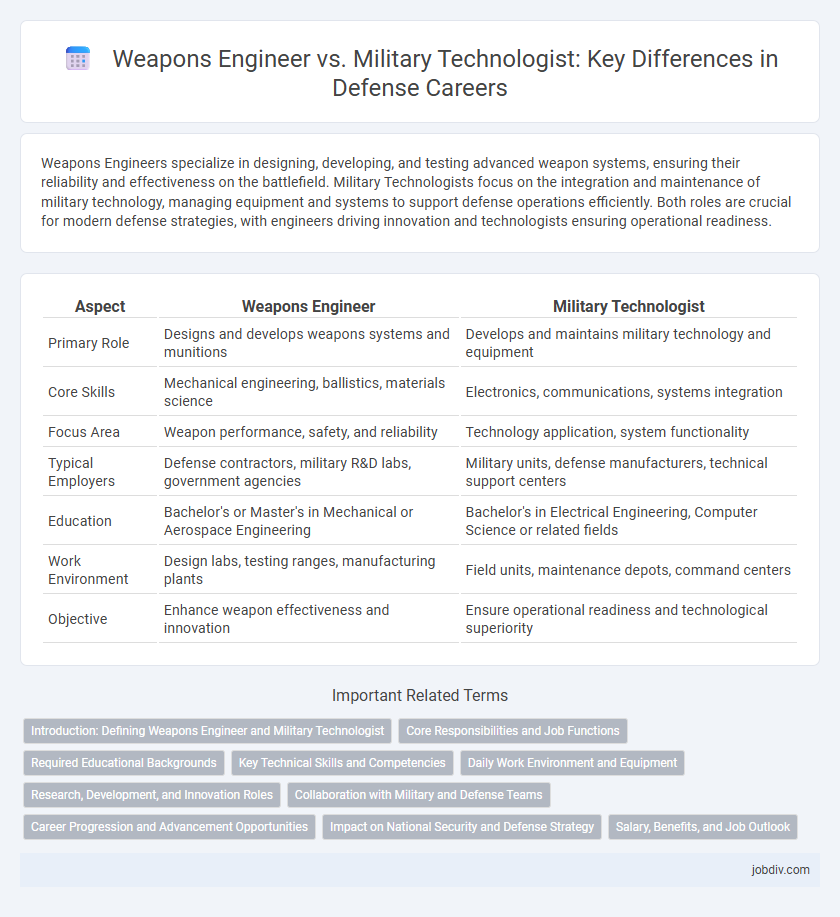Weapons Engineers specialize in designing, developing, and testing advanced weapon systems, ensuring their reliability and effectiveness on the battlefield. Military Technologists focus on the integration and maintenance of military technology, managing equipment and systems to support defense operations efficiently. Both roles are crucial for modern defense strategies, with engineers driving innovation and technologists ensuring operational readiness.
Table of Comparison
| Aspect | Weapons Engineer | Military Technologist |
|---|---|---|
| Primary Role | Designs and develops weapons systems and munitions | Develops and maintains military technology and equipment |
| Core Skills | Mechanical engineering, ballistics, materials science | Electronics, communications, systems integration |
| Focus Area | Weapon performance, safety, and reliability | Technology application, system functionality |
| Typical Employers | Defense contractors, military R&D labs, government agencies | Military units, defense manufacturers, technical support centers |
| Education | Bachelor's or Master's in Mechanical or Aerospace Engineering | Bachelor's in Electrical Engineering, Computer Science or related fields |
| Work Environment | Design labs, testing ranges, manufacturing plants | Field units, maintenance depots, command centers |
| Objective | Enhance weapon effectiveness and innovation | Ensure operational readiness and technological superiority |
Introduction: Defining Weapons Engineer and Military Technologist
Weapons Engineers specialize in the design, development, and testing of advanced weaponry and defense systems, integrating principles of mechanical, electrical, and materials engineering. Military Technologists focus on the application and management of military technology, ensuring that equipment and defense innovations are effectively implemented and maintained within operational settings. Both roles are critical in advancing defense capabilities, with Weapons Engineers driving innovation and Military Technologists optimizing technology use in tactical scenarios.
Core Responsibilities and Job Functions
Weapons Engineers specialize in designing, developing, and testing advanced weapon systems to ensure performance, safety, and reliability in combat scenarios. Military Technologists focus on integrating and maintaining military technology, including communication systems, surveillance equipment, and defensive tools, to enhance operational efficiency. Both roles require expertise in defense technology, but Weapons Engineers are primarily involved in innovation and weapon design, while Military Technologists emphasize system application and technical support.
Required Educational Backgrounds
Weapons Engineers typically require a bachelor's degree in mechanical, aerospace, or electrical engineering, often supplemented by specialized courses in ballistics or weapons systems design. Military Technologists usually hold degrees in defense technology, military science, or applied physics, with training focused on the operational use and maintenance of military hardware. Both roles demand strong foundations in STEM disciplines, but Weapons Engineers emphasize design and development, while Military Technologists concentrate on practical implementation and technological integration.
Key Technical Skills and Competencies
Weapons Engineers specialize in the design, development, and testing of advanced weapon systems, requiring expertise in ballistics, aerodynamics, materials science, and mechanical engineering. Military Technologists focus on the integration, maintenance, and upgrading of military hardware and software, demanding proficiency in systems engineering, electronics, cyber defense, and communications technology. Both roles require strong problem-solving abilities, knowledge of defense standards, and the capacity to work under stringent security protocols to enhance operational effectiveness.
Daily Work Environment and Equipment
Weapons Engineers primarily focus on designing, testing, and maintaining weapon systems, working closely with advanced computer-aided design (CAD) software, simulation tools, and testing laboratories. Military Technologists operate in diverse environments including field stations and military bases, managing and integrating communication systems, surveillance equipment, and defensive technologies. Both professionals require expertise in defense-grade hardware, but Weapons Engineers emphasize development and prototype testing while Military Technologists concentrate on operational deployment and system maintenance.
Research, Development, and Innovation Roles
Weapons Engineers specialize in designing, testing, and enhancing advanced weapon systems through materials science and ballistics research, focusing on optimizing firepower and safety. Military Technologists concentrate on integrating emerging technologies such as cyber capabilities, communication systems, and unmanned vehicles into defense frameworks, driving innovation and operational efficiency. Both roles collaborate closely in research and development to ensure cutting-edge defense solutions meet evolving threat landscapes.
Collaboration with Military and Defense Teams
Weapons engineers and military technologists play complementary roles in defense, with weapons engineers focusing on designing and developing advanced armaments while military technologists optimize the integration and deployment of defense systems. Both collaborate closely with military personnel to ensure that technological innovations meet operational requirements and enhance combat effectiveness. Effective teamwork between these specialists accelerates the modernization of weapons platforms and supports strategic defense initiatives.
Career Progression and Advancement Opportunities
Weapons engineers typically advance by gaining expertise in designing, testing, and improving advanced weapon systems, often moving into senior engineering roles or project management within defense contractors or military research facilities. Military technologists focus on integrating and maintaining military technologies, progressing toward specialized technical leadership or systems management positions within defense agencies or armed forces logistics units. Career growth for weapons engineers tends to emphasize innovation and product development, while military technologists advance through the mastery and deployment of existing and emerging defense technologies.
Impact on National Security and Defense Strategy
Weapons engineers design and develop advanced weaponry systems, directly enhancing a nation's offensive and defensive capabilities through innovation in firearms, missiles, and targeting technology. Military technologists specialize in integrating and maintaining defense technologies, ensuring operational readiness and seamless functionality of complex military systems. Both roles critically contribute to national security by driving technological superiority and sustaining strategic advantage in defense operations.
Salary, Benefits, and Job Outlook
Weapons Engineers typically command higher salaries, averaging $95,000 annually, compared to Military Technologists who earn around $75,000 per year. Benefits for Weapons Engineers often include comprehensive health coverage, retirement plans, and performance bonuses linked to defense contracts, while Military Technologists receive stable government benefits with emphasis on job security and pensions. The job outlook for Weapons Engineers shows a steady growth of 5% due to advancements in defense technology, whereas Military Technologists face moderate growth prospects around 3%, driven by ongoing military modernization efforts.
Weapons Engineer vs Military Technologist Infographic

 jobdiv.com
jobdiv.com